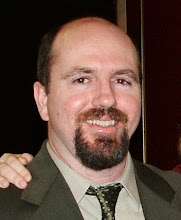The fascist state of mind can best be described as "Enough talk, more action!"
Close the books, get out of the library, get moving. Take action! What kind of
action? Direct action! Social action! Mass action! Revolutionary action! Action,
action, action. (p.170)
This emphasis on action arose out of their philosophical pragmatism. Fascism had no settled doctrine other than to do whatever works. Fascists claimed to stand outside the struggle between Left and Right, offering a "Third Way" that would not cling to ideological preconceptions, but would take whatever course was best for the country as a whole.
Mussolini was seen as moving beyond the "tired categories of left and right."
Similarly--like certain modern liberals--he promised what he called a "Third
Way" that was neither left nor right. He just wanted to get things done. (p.50)
So today I happened to click on the website for the McCain campaign for the first time, and was greeted with the headline: "It's Time For Action."
Clicking over to get the details on his economic plan, a video promises that, "As president, John McCain will take the best ideas from both parties to spur innovation, invest in people, and create jobs."
One attribute of fascism that Goldberg doesn't emphasize, but which Ayn Rand analyzed in detail in her speech, "The Fascist New Frontier," is its incessant calls for sacrifice. Not sacrifice as a means of attaining some greater value, but as a kind of ennobling asceticism.
Under both systems [communist and fascist], sacrifice is invoked as a magic,
omnipotent solution in any crisis--and the "public good" is the altar on which
victims are immolated. But there are stylistic differences of emphasis. The
socialist-communist axis keeps promising to achieve abundance, material comfort
and security for its victims, in some indeterminate future. The fascist-Nazi
axis scorns material comfort and security, and keeps extolling some
undefined sort of spiritual duty, service and conquest. The socialist-communist
axis offers its victims an alleged social ideal. The fascist-Nazi axis offers
nothing but loose talk about some unspecified form of racial or national "greatness."
Clicking on a link at the main page of the website indicated by the text, "A Cause Greater Than Your Own Self Interest," takes one to a page containing the following quote:
I am running for President of the United States because I believe in the
greatness of this nation as a beacon of goodwill throughout the world. My
friends, each and every one of us has a duty to serve a cause greater than our
own self-interest.
To be clear, I agree with Goldberg's thesis that the Left is essentially fascist. I don't think that McCain is any more fascist than Obama or Clinton, and in a lot of ways is probably better. I take it as a given that I could go to either of their websites and pull up plenty of horror quotes that would support Goldberg's claim regarding modern liberals. My point is just that we're being offered fascism on both sides. It is what Goldberg calls "smiley-face fascism," rather than the "gas-oven" fascism of Hitler, but it is most certainly fascism.
The value of Goldberg's book is that he makes it very clear that whatever is not classical liberalism in American politics is fascism. What he doesn't seem to realize is just how dead classical liberalism is on the right. There is a chapter at the end called "The Temptation of Conservatism," which I presume will discuss some of these issues, but given the way he talks about conservatism, he appears to believe that it is the same thing as classical liberalism. I don't think that's been true for a long time.


1 comment:
It's easier to think clearly on this topic if you refrain from referring to the Nazis as Fascists. I gather that that habit stems from Soviet propaganda, the Communists being reluctant to admit that the Nazis were socialists of any sort.
Post a Comment